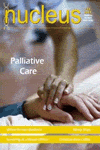I recently finished my psychiatry placement and I strongly suspect that it isn't the specialty for me! At the time, it seemed that the only good thing about the firm was a working day that started at 10:00 and was usually finished by 15:00. However, as I reflect back on it, I wonder if there weren't some important pointers worth taking back to the rest of medicine.
One of the most daunting things was learning how to take a psychiatric history. A typical clerking can take around an hour and goes into incredible detail: as well as the history of the presenting complaint, it is important to gain as much information as possible about the patient, their background and their personal history, exploring in depth their education, jobs, relationships etc.
Perhaps a patient's background and personal circumstances have more bearing on a mood disorder than, say, hypothyroidism, but frequently general medics are left with less than ten minutes in a clinic to take a history from a patient, and this often only allows you to focus on the specifics of the presenting complaint and any other relevant clinical details. The new format of medical student exams, with timed practical stations, even encourages us to get into the habit of clerking against the clock.
The articles in this edition of Nucleus encourage us to start thinking beyond this box. Mike Sheldon is medical director of the Whole Person Health Trust, a Christian organisation which recognises that the thoughts, beliefs and attitudes of a patient have a large part to play, both in them staying healthy and combating disease. On pp18-25 he argues that we need to be taking into account all these details about the patient and their circumstances, and treating the person behind the symptoms, not just their disease and physical body.
Palliative care is one area of medicine where a holistic approach is key, integrating physical, emotional, spiritual and social aspects of care; yet it is not without its difficulties. Jeff Stephenson discusses the Christian origins of the specialty, why he chose it as a career, and the opportunities and challenges it presents (pp11-17).
Many Nucleus readers will be facing the transition this summer from medical student to junior doctor. This can be a period of enormous change and unique challenges. On pp26-32 CMF Relay worker, Laurence Crutchlow, draws on his own experience to offer tips on how to survive this time.
Finally, as Abi Boys says in her article about an unusual year out of medical school (pp33-35), God has great plans in mind for each one of us. Even if, like me, it's still a while before you graduate as a doctor, I don't think it's ever too early to start thinking and praying about where God is calling us to serve him in medicine, and equipping ourselves to do this to the best of our ability.
One of the most daunting things was learning how to take a psychiatric history. A typical clerking can take around an hour and goes into incredible detail: as well as the history of the presenting complaint, it is important to gain as much information as possible about the patient, their background and their personal history, exploring in depth their education, jobs, relationships etc.
Perhaps a patient's background and personal circumstances have more bearing on a mood disorder than, say, hypothyroidism, but frequently general medics are left with less than ten minutes in a clinic to take a history from a patient, and this often only allows you to focus on the specifics of the presenting complaint and any other relevant clinical details. The new format of medical student exams, with timed practical stations, even encourages us to get into the habit of clerking against the clock.
The articles in this edition of Nucleus encourage us to start thinking beyond this box. Mike Sheldon is medical director of the Whole Person Health Trust, a Christian organisation which recognises that the thoughts, beliefs and attitudes of a patient have a large part to play, both in them staying healthy and combating disease. On pp18-25 he argues that we need to be taking into account all these details about the patient and their circumstances, and treating the person behind the symptoms, not just their disease and physical body.
Palliative care is one area of medicine where a holistic approach is key, integrating physical, emotional, spiritual and social aspects of care; yet it is not without its difficulties. Jeff Stephenson discusses the Christian origins of the specialty, why he chose it as a career, and the opportunities and challenges it presents (pp11-17).
Many Nucleus readers will be facing the transition this summer from medical student to junior doctor. This can be a period of enormous change and unique challenges. On pp26-32 CMF Relay worker, Laurence Crutchlow, draws on his own experience to offer tips on how to survive this time.
Finally, as Abi Boys says in her article about an unusual year out of medical school (pp33-35), God has great plans in mind for each one of us. Even if, like me, it's still a while before you graduate as a doctor, I don't think it's ever too early to start thinking and praying about where God is calling us to serve him in medicine, and equipping ourselves to do this to the best of our ability.
































